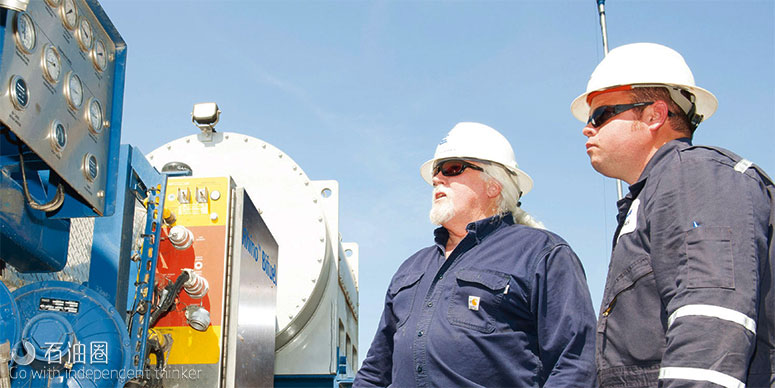Baker Hughes Rhino? Bifuel pumps reduce air emissions, increase efficiency, and decrease diesel fuel consumption without sacrifi cing hydraulic horsepower. These hydraulic fracturing pumps maximize wellsite efficiency and reduce environmental impact while maintaining the effectiveness of the fracturing job.
Rhino Bifuel pumps reliably deliver fluid into a well for hydraulic fracturing or acid stimulation operations. These robust units generate 2,000 HHP at pressures up to 15,000 psi (103.4 MPa), with the exact rate determined by the plunger size used in the fluid end. Units can be confi gured with triplex or quintaplex pumps and are typically trailer mounted for easy transport to locations. Skid-mounted versions are also available. High-performance Rhino Bifuel pumps deliver the same outstanding performance as our standard Rhino pumps, when they are modified to run on a combination of diesel and readily available liquefied natural gas (LNG), compressed natural gas (CNG), or natural gas. Even with substitution rates as high as a combination of 70% natural gas with 30% diesel, these pumps can produce 2,000 hydraulic horsepower.
Reduce your environmental impact without compromising performance in continuous multistage frac operations.
Using cleaner-burning natural gas, the Baker Hughes Bifuel service reduces diesel consumption, ensures productivity, and lowers HSE risks from spills and fire hazards. Our proven bifuel pumps will extend your runtimes, maintain your hydraulic horsepower, and help you comply with environmental regulations.
Applications
Unconventional oil and gas formations:
–Hydraulic fracturing operations;
–Acid stimulation operations;
–Workover and remediation operations.
Features and Benefits
1.Combination fuel
– Improves efficiency without loss of hydraulic power;
– Reduces refueling requirements and risks;
– Operates on a fuel blend or 100% diesel.
2.Reduced diesel consumption:
–Meets all EPA emission standards;
–Reduces NOx emissions by up to 50%;
–Decreases particulate-matter emissions;
–Nearly eliminates carbon monoxide.
3.Increased wellsite efficiency:
– Extends pump runs as much as 2x conventional diesel-powered pumps;
– Provides nonstop fracturing operations.
4.Reduced HSE risks:
–Improves personnel and job-site safety;
–Lowers refueling operations and risks.
Case History1
A Baker Hughes customer operating in the Eagle Ford shale play wanted to improve the overall effi ciency of their hydraulic fracturing operations, reduce fuel costs, and minimize health, safety, and environmental risks (specifi cally long-term emissions). Baker Hughes proposed using its Rhino? bifuel pumps.
Baker Hughes Rhino bifuel pumps use a mixture of natural gas and diesel to reduce diesel use by up to 65% with no loss of hydraulic horsepower. Even though natural gas has a lower British thermal unit (BTU) content than diesel, burning more natural gas on a volume basis maintains the output. At a 50% substitution rate, the fuel will last twice as long and nearly eliminate hot fueling. It will also reduce truck traffi c on location. The pumps, which meet all U.S. Environmental Protection Agency (EPA) emission standards, also can reduce a number of emissions including nitrogen oxides, carbon monoxide, and particulate matter.
Using an energy substitution, the bifuel system substituted 1.7 gal (6 L) of liquefi ed natural gas (LNG) for 1 gal (4 L) of diesel and fractured 35 stages without loss of horsepower. The job was pumped safely and successfully and achieved 60 to 65% natural gas substitution and seamless operation between the natural gas and diesel systems. The Baker Hughes bifuel equipment performed as well as a straight diesel fuel pump without any interruption in pumping or any negative environmental impact.
The customer was extremely satisfi ed with the results. In addition, the performance of the Baker Hughes Bifuel Services has resulted in additional interest in bifuel applications from other major operators in the area.
Case History2
An operator in the DJ Basin formation wanted to improve the overall effi ciency of hydraulic fracturing operations by reducing fuel costs and minimizing health, safety, and environmental risks as well as longterm emissions. To meet these objectives, Baker Hughes recommended its bifuel service incorporating high-performance Rhino Bifuel pumps.
These pumps can reduce diesel consumption by up to 70% with no loss of hydraulic horsepower (HHP) using a mixture of natural gas and diesel. Rhino Bifuel pumps introduce gas into the air intake of the engine, creating a diesel and gas mixture for combustion. Using exhaust gas catalysts can reduce the total hydrocarbon output and the carbon dioxide output by 10%.
Even though natural gas has a lower BTU content than diesel, the Rhino Bifuel pumps maintain output by burning more natural gas on a volume basis. At a 50% substitution rate, the diesel fuel will last twice as long and nearly eliminate hot fueling. It will also reduce truck traffi c on location. The pumps meet all U.S. Environmental Protection Agency (EPA) emission standards and can reduce a number of emissions including nitrogen oxides, carbon monoxide, and particulate matter.
Using Rhino Bifuel pumps, the job was pumped safely and successfully and achieved up to 62% natural gas substitution with seamless operation between the natural gas and diesel systems. The Rhino Bifuel equipment delivered the same horsepower rates as pumps powered by 100% diesel, with no negative environmental impact.
The customer was extremely satisfi ed with the results. The Baker Hughes Rhino Bifuel service has been used in 217 stages, with more stages in the DJ Basin being planned.

 石油圈
石油圈
